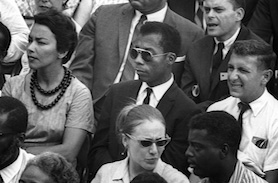I Am Not Your Negro
 USA, FRANCE, BELGIUM, SWITZERLAND / 2016 / English / Color / DCP / 93 min
USA, FRANCE, BELGIUM, SWITZERLAND / 2016 / English / Color / DCP / 93 min
Director: Raoul Peck
Photography: Henry Adebonojo, Bill Ross, Turner Ross
Editing: Alexandra Strauss
Text: James Baldwin
Narration: Samuel L. Jackson
Animation: Michel Blustein
Sound: Valérie Le Docte, David Gillain
Music: Alexei Aigui
Producers: Rémi Grellety, Raoul Peck, Hébert Peck
Production Companies: Velvet Film, Inc., Artémis Productions, Close Up Films
World Sales: ICM Partners, Wide House
Based on Remember This House, an unfinished manuscript by African American writer James Baldwin, this film depicts the tumultuous contemporary history of African Americans by tracing of the stories of three assassinated activists—Medgar Evers, Malcolm X, and Martin Luther King, Jr. The unchanged nature of discrimination—despite the achievement of legal equality—is thrown into relief by Baldwin’s lectures, and remarks he made on television, intertwined with film clips and excerpts from musical performances. Haitian director Raoul Peck spent many years developing this film, which is narrated by actor Samuel L. Jackson.
[Director’s Statement] I started reading James Baldwin when I was a fifteen-year-old boy in search of rational explanations for the contradictions I was confronting in my already nomadic life, which would take me from Haiti to Congo to France to Germany and to the United States of America. He was one of the few authors I could call “my own.” Authors who were speaking of a world I knew, in which I was not just a footnote or a third-rate character. They were telling stories describing history and defining structures and human relationships that matched what I was seeing around me.
Medgar Evers died on June 12, 1963. Malcolm X died on February 21, 1965. And Martin Luther King, Jr., died on April 4, 1968. Over the course of five years, the three men were assassinated.
They were black, but it is not the color of their skin that connected them. They fought on quite different battlefields. And quite differently. But in the end, all three were deemed dangerous and therefore disposable. For they were eliminating the haze of racial confusion.
Like them, James Baldwin also saw through the system. And he knew and loved these men.
He was determined to expose the complex links and similarities among Medgar, Malcolm, and Martin. He planned to write about them. He was going to write his ultimate book, Remember This House.
I came upon these three men and their assassinations much later. Nevertheless, these three facts, these elements of history, form the starting point, the “evidence” you might say, for a deep and intimate personal reflection on my own political and cultural mythology, my own experiences of racism and intellectual violence.
This is exactly the point when I really needed James Baldwin. He gave me a voice, gave me the words, gave me the rhetoric.
Raoul Peck’s complex body of work includes the narrative films The Man by the Shore (1993, Screened in competition at the 1993 Cannes Film Festival), and Lumumba (2000, Director’s Fortnight, Cannes 2000, also bought and aired by HBO). He also directed and produced Sometimes in April for HBO (2005, Berlinale 2005), Moloch Tropical (2009, Toronto 2009, Berlinale 2010), and Murder in Pacot (2014, Toronto 2014, Berlinale 2015). His documentaries include Lumumba, Death of a Prophet (1990), Desounen, Dialogue with Death (1994, BBC); and Fatal Assistance (2013, Berlinale, Hot Docs 2013). He served as a jury member at Cannes in 2012, as well as at Berlin in 2002. He is presently chairman of the national French film school La Fémis, and has been the subject of numerous retrospectives worldwide. In 2001, Human Rights Watch awarded him the Irene Diamond Lifetime Achievement Award. His latest feature film, The Young Karl Marx (2017), premiered at the 67th Berlin International Film Festival.
